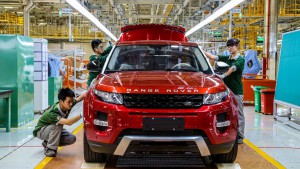
GM saw sales of its vehicles drop 6% in July. It's stock price has dropped more than 3% since China devalued the yuan earlier this week.
The abrupt devaluation of the Chinese yuan is likely to cost global automakers dearly in the months to come.
The value of the yuan dropped by 2% so far this week, reducing the revenue and profits earned by global automakers, such as General Motors Co., Ford Motor Co., BMW AG, Volkswagen AG and others. The government-ordered depreciation of the yuan follows a general slowdown in the Chinese economy during the last six months.
Motorists in the world’s biggest market bought 1.3 million cars, minivans and other passenger vehicles last month, according to the China Association of Automobile Manufacturers. The slump in China’s auto market worsened in July as sales contracted by 6.6%, industry figures showed Wednesday.
The impact on automakers was immediate as the stock prices of many companies fell. Daimler AG lost 5.2% and Volkswagen AG fell 4.1%. The decline was 3.5% at General Motors Co. and 1.9% at Ford Motor Co. Of those, only Daimler’s luxury car unit, Mercedes-Benz, posted a sales increase in July: a robust 42%.

A Range Rover Evoq moves down the assembly line at a plant near Shanghai. Luxury vehicle sales are expected to take a hit due to the devalued yuan.
“Current business developments in China present us and other automobile manufacturers with challenges we foresaw a long time ago,” BMW said in a statement Tuesday, adding that China’s low rates of car ownership and a growing middle class mean prospects for mid- to long-term growth are unchanged.
GM was also cautiously optimistic about the event.
“We believe that our exposure is limited and manageable, and do not expect that the devaluation will have a material impact on the company’s financial performance,” GM said in a statement.
In response to the economic slowdown, the People’s Bank of China said it was revising its calculation for setting the Yuan exchange rate. The shift aligns with efforts to further prop up growth in non-financial sectors, according to IHS Inc., a leading global source of economic information.
Growth in most sectors of China’s economy, except finance, slowed during the second quarter. Leading the deceleration was China’s export-dependent industrial sector, which has lost its share of the market in recent years, but nonetheless still remains a significant contributor to both total output levels and employment.
(Ford China sales dip 6% in July. For more, Click Here.)
IHS said the volatility since June in China’s financial markets has cast significant doubt on the ability of finance to further support growth in the second half. Export performance has been highly erratic and generally poor in China during 2015. While the dollar-yuan exchange rate was relatively stable during the past several quarters, the yuan’s real effective exchange rate against all trading partners appreciated by more than 10%.
“While the central bank described the change as a step towards greater market forces, which it may ultimately be, the timing certainly aligns with current efforts to further shore up growth in non-financial sectors,” said Brian Jackson, IHS Global Insight economist. “In addition, the government is keen to highlight steps towards greater marketization and transparency in its exchange rate regime, given its interest in joining the IMF’s Special Drawing Rights basket.”
(Click Here for details about GM’s July sales drop in China.)
Starting this week, the official daily central parity rate will be based on the closing rate of the interbank foreign exchange rate market from the previous day, the supply and demand in the market, and the price movement of major currencies. Previously, the central parity rate was set using an unpublished formula based only on a basket of currencies that was widely believed to be prone to official intervention.
The Chinese devaluation has also stirred uneasiness among China’s economic competitors, who fear China’s producers could use the less expensive currency to reduce prices in global markets.
(To see more about BMW’s difficulties in China last month, Click Here.)
“While it is too early to judge the full implications of the change … China has indicated that the changes announced today are another step in its move to a more market-determined exchange rate,” a U.S. Treasury official said.
“Any reversal in reforms would be a troubling development,” the Treasury said.
